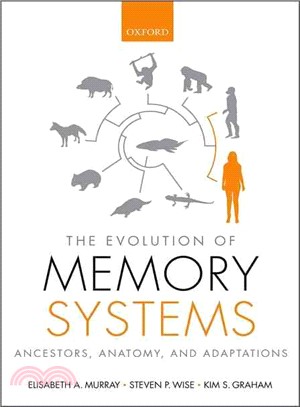The Evolution of Memory Systems ─ Ancestors, Anatomy, and Adaptations
商品資訊
ISBN13:9780199686438
出版社:OUP Academic UK
作者:Elisabeth Murray; Steven Wise; Kim Graham
出版日:2017/01/10
裝訂/頁數:精裝/512頁
規格:24.8cm*17.1cm*3.2cm (高/寬/厚)
版次:1
定價
:NT$ 5000 元優惠價
:90 折 4500 元
若需訂購本書,請電洽客服 02-25006600[分機130、131]。
商品簡介
作者簡介
相關商品
商品簡介
Current theories about human memory have been shaped by clinical observations and animal experiments. This doctrine holds that the medial temporal lobe subserves one memory system for explicit or declarative memories, while the basal ganglia subserves a separate memory system for implicit or procedural memories, including habits. Cortical areas outside the medial temporal lobe are said to function in perception, motor control, attention, or other aspects of executive function, but not in memory.
'The Evolution of Memory Systems' advances dramatically different ideas on all counts. It proposes that several memory systems arose during evolution and that they did so for the same general reason: to transcend problems and exploit opportunities encountered by specific ancestors at particular times and places in the distant past.
Instead of classifying cortical areas in terms of mutually exclusive perception, executive, or memory functions, the authors show that all cortical areas contribute to memory and that they do so in their own ways-using specialized neural representations. The book also presents a proposal on the evolution of explicit memory. According to this idea, explicit (declarative) memory depends on interactions between a phylogenetically ancient navigation system and a representational system that evolved in humans to represent one's self and others. As a result, people embed representations of themselves into the events they experience and the facts they learn, which leads to the perception of participating in events and knowing facts.
'The Evolution of Memory Systems' is an important new work for students and researchers in neuroscience, psychology, and biology.
'The Evolution of Memory Systems' advances dramatically different ideas on all counts. It proposes that several memory systems arose during evolution and that they did so for the same general reason: to transcend problems and exploit opportunities encountered by specific ancestors at particular times and places in the distant past.
Instead of classifying cortical areas in terms of mutually exclusive perception, executive, or memory functions, the authors show that all cortical areas contribute to memory and that they do so in their own ways-using specialized neural representations. The book also presents a proposal on the evolution of explicit memory. According to this idea, explicit (declarative) memory depends on interactions between a phylogenetically ancient navigation system and a representational system that evolved in humans to represent one's self and others. As a result, people embed representations of themselves into the events they experience and the facts they learn, which leads to the perception of participating in events and knowing facts.
'The Evolution of Memory Systems' is an important new work for students and researchers in neuroscience, psychology, and biology.
作者簡介
Elizabeth Murray, National Institute of Mental Health in Bethesda, Maryland, Head of the Laboratory of Neuropsychology,Steven Wise, National Institute of Mental Health in Bethesda, Maryland, Former Chief of the Laboratory of Neurophysiology and Chief of the Section on Neurophysiology of the Laboratory of Systems Neuroscience,Kim Graham, University of Cardiff, Professor of Cognitive Neuroscience
Elisabeth A. (Betsy) Murray was raised with her three brothers in Syracuse, New York. She received a B.S. in Biology from Bucknell University in Lewisburg, Pennsylvania and a Ph.D. in Physiology from the University of Texas Medical Branch at Galveston, Texas. Dr. Murray is an elected Fellow of the Association for Psychological Science, of the American Psychological Association, and of the American Association for the Advancement of Science. She currently heads the Laboratory of Neuropsychology at the National Institute of Mental Health in Bethesda, Maryland.
Steven P. Wise received a B.A. in Biology from Dartmouth College and a Ph.D. from Washington University (St. Louis) in Biology. After a brief period of postdoctoral study, he had a 30-year career in neurophysiology at the National Institute of Mental Health in Bethesda and Poolesville, Maryland. Dr Wise served as Chief of the Laboratory of Neurophysiology and Chief of the Section on Neurophysiology of the Laboratory of Systems Neuroscience.
Kim S. Graham received a B.Sc. In Biological Sciences from Edinburgh University, followed by a Ph.D. from Cambridge University in Psychology. She subsequently worked as a research scientist at the MRC Cognition and Brain Sciences for 12 years, prior to moving to Cardiff University in 2007, where she is currently a Professor of Cognitive Neuroscience.
主題書展
更多
主題書展
更多書展今日66折
您曾經瀏覽過的商品
購物須知
外文書商品之書封,為出版社提供之樣本。實際出貨商品,以出版社所提供之現有版本為主。部份書籍,因出版社供應狀況特殊,匯率將依實際狀況做調整。
無庫存之商品,在您完成訂單程序之後,將以空運的方式為你下單調貨。為了縮短等待的時間,建議您將外文書與其他商品分開下單,以獲得最快的取貨速度,平均調貨時間為1~2個月。
為了保護您的權益,「三民網路書店」提供會員七日商品鑑賞期(收到商品為起始日)。
若要辦理退貨,請在商品鑑賞期內寄回,且商品必須是全新狀態與完整包裝(商品、附件、發票、隨貨贈品等)否則恕不接受退貨。














![Wicked [Movie Tie-In]:魔法壞女巫電影原著](https://cdnec.sanmin.com.tw/product_images/006/006285284.jpg)









